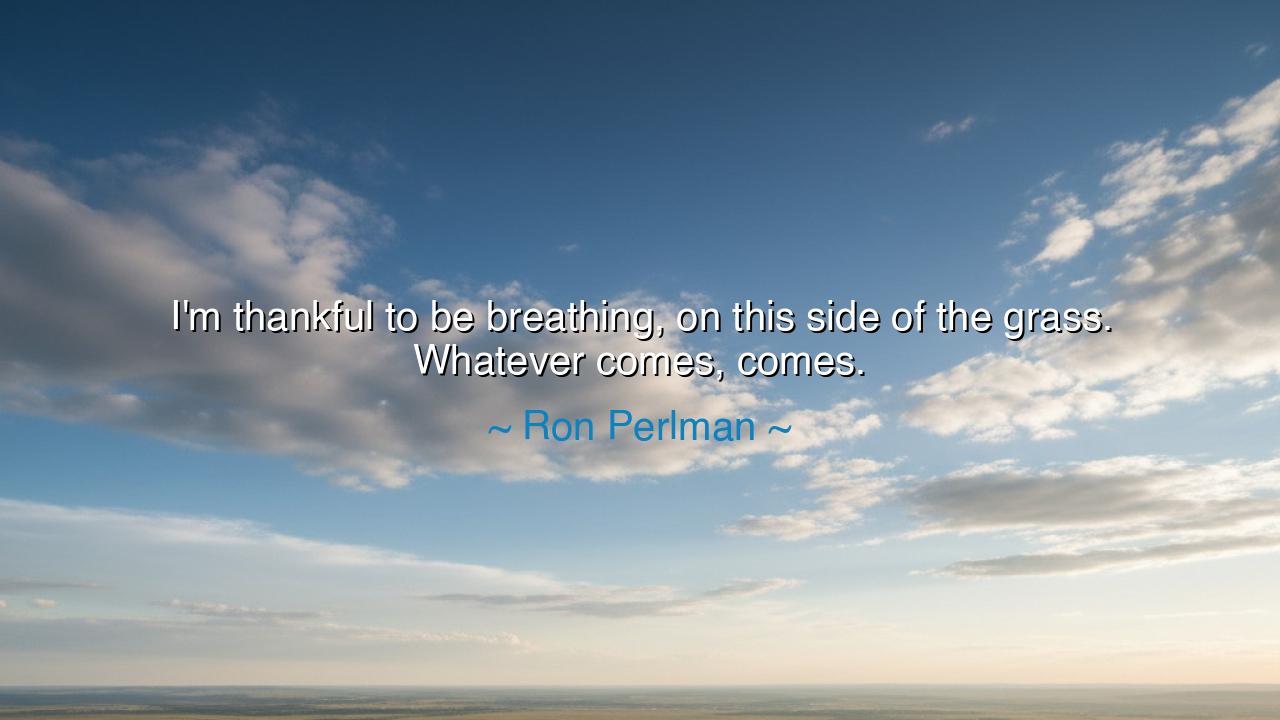
I'm thankful to be breathing, on this side of the grass.






The words of Ron Perlman fall with the weight of both humor and wisdom: “I’m thankful to be breathing, on this side of the grass. Whatever comes, comes.” Though light in tone, they conceal a truth as ancient as the first dawn: life itself, the simple act of breath, is a gift beyond measure. To be alive, to feel the sun upon one’s face, to walk upon the earth rather than lie beneath it—this is the foundation of all gratitude. Everything else, whether triumph or trial, comes after.
To be thankful for breath is to recognize the fragility of existence. So many rise not from their sleep, so many are claimed by accident or illness, yet here we stand, still walking upon the grass, still tasting the air. Perlman’s words echo the wisdom of the Stoics, who counseled daily remembrance of mortality. For the one who remembers death is the one who cherishes life. And in this remembrance, fear begins to fade, for if we can be grateful simply to breathe, then no hardship can fully rob us of joy.
The phrase “this side of the grass” speaks with earthy imagery. It is a blunt reminder of the grave, the soil that waits for all flesh. Yet rather than dread, it calls forth levity and courage. If we are not beneath the ground, then we yet have work to do, love to share, beauty to behold. It is a call to live in the present moment, to accept that whatever comes, comes, but to meet it not with despair but with the gratitude of the living.
Consider the life of Viktor Frankl, survivor of the Nazi concentration camps. Surrounded by death and despair, he found meaning in the simple gift of being alive, even in the harshest conditions. He spoke of prisoners who, though stripped of everything, still found wonder in a sunset glimpsed through barbed wire, or in the memory of a loved one. Frankl’s teachings in Man’s Search for Meaning echo Perlman’s sentiment: to be thankful for life itself is to wield an inner freedom that no power can take away.
So too did ancient warriors live by this creed. Before battle, many would chant prayers of gratitude simply for being alive at that dawn, knowing the day might be their last. By giving thanks for breath, they freed themselves from the terror of death. Thus, they could face whatever came—victory, loss, or the grave—with courage. Gratitude for life itself becomes a shield, turning even suffering into something bearable, even noble.
The lesson, then, is both simple and profound: do not wait for wealth, success, or comfort to be thankful. Begin with breath. Begin with the beating of your heart, the soil beneath your feet, the light of morning. From this foundation, let gratitude spill over into every other part of life. For when you are anchored in thankfulness simply for being alive, you can face the uncertainties of tomorrow without fear. Truly, whatever comes, comes—but it finds you strong, unshaken, grateful.
Practically, let us practice this wisdom each day. Upon waking, whisper thanks for the breath in your lungs. Step outside, place your feet upon the earth, and remember that to stand above the grass is itself victory. When trials come, recall that you are still alive, still given a chance to rise, to mend, to love, to labor. Let gratitude for life be the first thought of morning and the last prayer of night.
Thus, Ron Perlman’s words, half jest and half truth, shine as an enduring counsel: to be thankful for life itself is the highest form of strength. For if you can rejoice in the simple gift of breath, then no shadow can extinguish your light. Stand firm upon the earth, grateful for each heartbeat, and face the unknown with courage. Breathe. Give thanks. Live. Whatever comes, comes.






AAdministratorAdministrator
Welcome, honored guests. Please leave a comment, we will respond soon